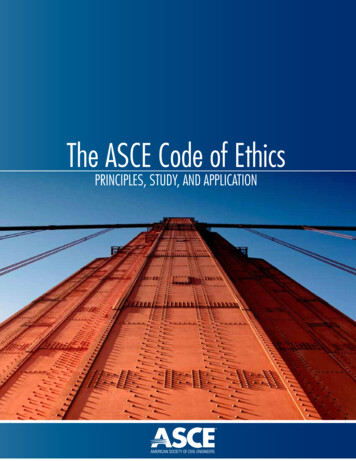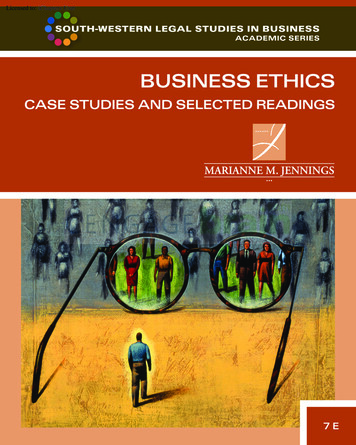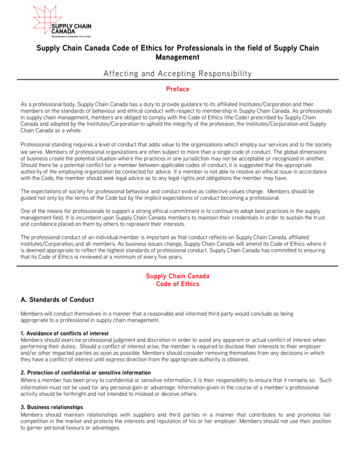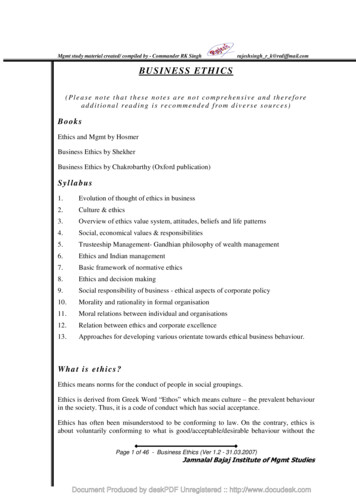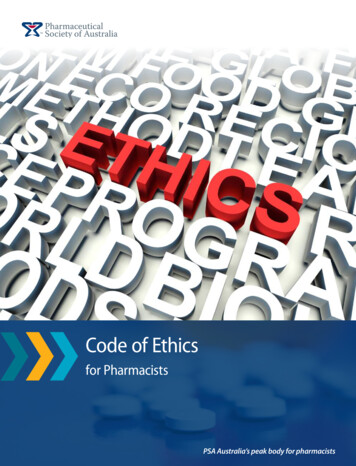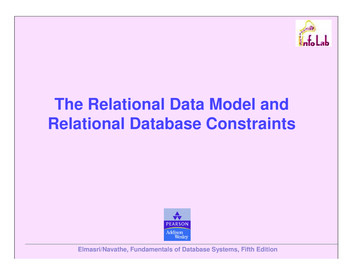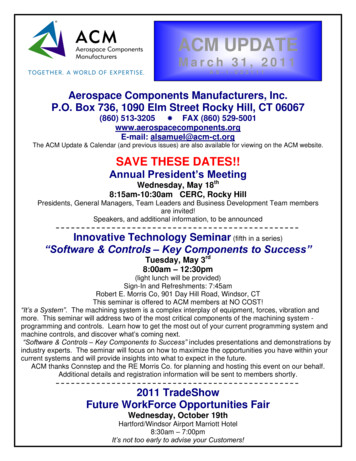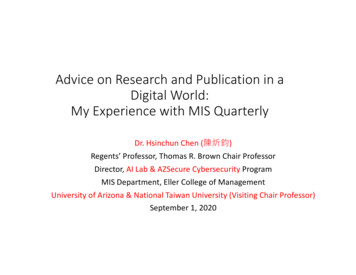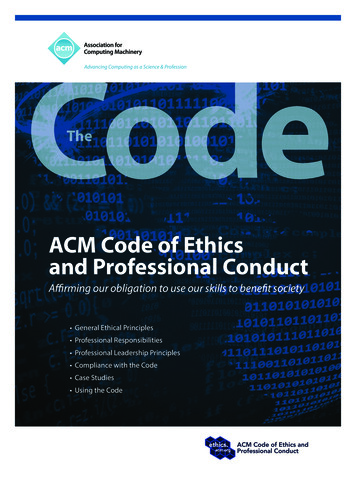
Transcription
CodeTheACM Code of Ethicsand Professional ConductAffirming our obligation to use our skills to benefit society General Ethical Principles Professional Responsibilities Professional Leadership Principles Compliance with the Code Case Studies Using the Codec1 ACM Code0830.indd 18/30/18 10:44 AM
CODE 2018 INTERNATIONALTASK FORCEACM COMMITTEE ONPROFESSIONAL ETHICSExecutive CommitteeDon Gotterbarn, Co-ChairMarty J. Wolf, Co-ChairFlorence AppelBo BrinkmanKarla CarterCatherine FlickFran GrodzinskyKai KimppaMichael S. KirkpatrickAnthony LoboKeith MillerDenise OramThomas OwensNorberto PatrignaniSimon RogersonKate VazanskyDon Gotterbarn, ChairBo BrinkmanCatherine FlickMichael S. KirkpatrickKeith MillerKate VazanskyMarty J. WolfProject Task ForceEve AndersonRon AndersonAmy BruckmanKarla CarterMichael DavisPenny DuquenoyJeremy EpsteinKai KimppaLorraine KisselburghShrawan KumarAndrew McGettrickNatasa Milic-FraylingDenise OramSimon RogersonDavid ShamaJanice SipiorEugene SpaffordJulia StoyanovichLes WaguespackACM COUNCILPresidentCherri M. PancakeVice PresidentElizabeth Frances ChurchillSecretary/TreasurerYannis E. IoannidisPast PresidentAlexander L. WolfPublications Board Co-ChairsJack Davidson and Joseph A. KonstanSIG Governing Board ChairJeff JortnerMembers-at-LargeGabriele Anderst-Kotsis, Susan T. Dumais,Renée McCauley, Claudia Bauzer Medeiros,Elizabeth D. Mynatt, Pamela Samuelson,Theo Ezell Schlossnagle, and Eugene H. SpaffordSGB Council RepresentativesSarita Adve and Jeanna Neefe MatthewsISBN 978-1-4503-6626-7DOI 10.1145/3274591Copyright 2018 by the Association for Computing Machinery, Inc. (ACM)c1 ACM Code0830.indd 28/30/18 10:44 AM
1ACM CODE OF ETHICS AND PROFESSIONAL CONDUCTLetter from the PresidentComputing professionals have a profound impact on both public and privatelife. Part of ACM’s role is to guide computing’s impact in order to better the world.As a professional organization, ACM identifies who we are by what we value. TheACM Code of Ethics and Professional Conduct clearly states what is essential toprofessional life. The Code is a contract among ourselves as professionals, as well asa public statement of our understanding of the responsibilities the profession hasto the larger society that it serves.With computing technology so interwoven into the fabric of daily life, the workthat computing professionals do is essential to ensuring that technology is usedto improve the lives of all people. Computing professionals also are the first lineof defense against the misuse of technology. Our collective understanding ofcomputing systems puts us in a position to protect sensitive information andensure that systems integrate in ways that are appropriate, safe, and reliable.Society needs to be assured that we are committed to ethical conduct as thefoundation of our work. That need has become the personal responsibility of everyprofessional in our industry.When the ACM Code of Ethics was last updated in 1992, many of us saw computingwork as purely technical. The World Wide Web was in its infancy and people werejust beginning to understand the value of being able to aggregate and distributeinformation widely. Today, we find ourselves in situations where our work canaffect the lives and livelihoods of people in ways that may not be intended, or evenbe predictable. This brings a host of complex ethical considerations into play.The ACM Code of Ethics is designed to help guide the aspirations of all computingprofessionals in doing our work. It acknowledges that ethical decisions are notalways easily arrived at, and exhorts us, as professionals, to develop not only ourtechnical abilities but our skills in ethical analysis as well.This booklet, with both the Code and examples of applying the Code, is just thestarting point, though. ACM’s Committee on Professional Ethics has created arepository for case studies showing how ethical thinking and the Code can beapplied in a variety of real-world situations. The “Ask an Ethicist” blog invites peopleto submit scenarios or quandaries as they arise in practice. Efforts are underwayto develop ways to incorporate ethical considerations throughout the computerscience curriculum, at levels from primary through graduate school.The ACM Code of Ethics and Professional Conduct begins with the statement,“Computing professionals’ actions change the world.” The participation ofprofessionals from around the world in developing the ACM Code of Ethicsdemonstrates that the global computing community understands the impact ourwork has—and that we take seriously our obligation to the public good.Cherri M. PancakeACM Presidentc1 ACM Code0830.indd 18/30/18 10:45 AM
2ACM CODE OF ETHICS AND PROFESSIONAL CONDUCTA Guide for Positive ActionComputing advances in the 21st century have intensified the depth andbreadth of the field’s impact on society. Computing now shapes and definesthe structures of society, interacting with and producing new socio-technicalstructures. Computing is no longer merely a support structure for doing complexcalculations. It influences the essence of our being, running insulin pumps andpacemakers, managing our friendships, and identifying who should be punished,promoted, and hired. The roles and responsibilities of computing professionalshave thus also undergone profound transformations that are reflected in thisupdate to the ACM Code of Ethics and Professional Conduct.As a rapidly changing and complex field, computing requires a high level oftechnical skill. High-speed and high-capacity communications facilitate localdecisions that have a global impact on all aspects of society, including individualcitizens. Fortunately, most of our ethical decisions are almost automatic, andconsist of applying ethical decision skills we learned in our formative years. Yet, dueto computing’s role in changing society and the nature of human interaction, weneed to revisit those ethical standards to clarify how they apply to the decisionsof computing professionals. The complexity of computing systems often leads toa narrow focus on technical requirements, potentially missing the needs of somestakeholders. A book reading app may meet the requirement of enlarging font sizefor the visually challenged, but fail to consider the user when the instructions toachieve this effect are in a tiny font. In this example the system is an ethical failure,although it meets the technical requirement.The change in the nature of computing’s impact means that every decisionrequires us to identify a broader range of stakeholders and consider how to satisfyour obligations to them. A primary function of the Code is to help computingprofessionals identify potential impacts and promote positive outcomes in theirsystems. It also informs the public about important professional responsibilitiesand educates practitioners on the standards that society expects them to meet.Further, it makes clear to aspiring computing professionals what their peers strivefor and expect of each other. As a reflection of the collective conscience of thecomputing profession, it encourages professionals to undertake positive actionsand to resist pressure to act unethically.The Code, like many modern codes, provides ethical principles that are to be takenas a whole. Considering a single principle often leads to incomplete responsesto complex questions. Used holistically, the Code is an inspiring guide. But keepin mind that using it this way requires professionals to make ethical judgmentsabout how various possible actions are consistent with (or conflict with) theCode’s principles and, thus, expands the meaning of professionalism beyond meretechnical competence.Before you read the Code, call to mind a recent project. Use the Code to help youidentify facts, stakeholders, and obligations that you might not have consideredpreviously. Use the principles as springboards to different alternatives for decisions youmade. Then ask yourself how that project could have made a more positive impact.Don Gotterbarn and Marty J. WolfCo-Chairs, ACM Committee on Professional Ethicsc1 ACM Code0830.indd 28/30/18 10:45 AM
3ACM CODE OF ETHICS AND PROFESSIONAL CONDUCTThe CodeACM Code of Ethics and Professional ConductPreambleComputing professionals’ actions change theworld. To act responsibly, they should reflect uponthe wider impacts of their work, consistentlysupporting the public good. The ACM Code ofEthics and Professional Conduct (“the Code”)expresses the conscience of the profession.The Code is designed to inspire and guide the ethical conduct of all computingprofessionals, including current and aspiring practitioners, instructors, students,influencers, and anyone who uses computing technology in an impactful way.Additionally, the Code serves as a basis for remediation when violations occur.The Code includes principles formulated as statements of responsibility, basedon the understanding that the public good is always the primary consideration.Each principle is supplemented by guidelines, which provide explanations to assistcomputing professionals in understanding and applying the principle.Section 1 outlines fundamental ethical principles that form the basis forthe remainder of the Code. Section 2 addresses additional, more specificconsiderations of professional responsibility. Section 3 guides individuals who havea leadership role, whether in the workplace or in a volunteer professional capacity.Commitment to ethical conduct is required of every ACM member, and principlesinvolving compliance with the Code are given in Section 4.The Code as a whole is concerned with how fundamental ethical principles applyto a computing professional’s conduct. The Code is not an algorithm for solvingethical problems; rather it serves as a basis for ethical decision-making. Whenthinking through a particular issue, a computing professional may find thatmultiple principles should be taken into account, and that different principles willhave different relevance to the issue. Questions related to these kinds of issuescan best be answered by thoughtful consideration of the fundamental ethicalprinciples, understanding that the public good is the paramount consideration.The entire computing profession benefits when the ethical decision-makingprocess is accountable to and transparent to all stakeholders. Open discussionsabout ethical issues promote this accountability and transparency.c1 ACM Code0830.indd 38/30/18 10:46 AM
4ACM CODE OF ETHICS AND PROFESSIONAL CONDUCT1 General Ethical PrinciplesA computing professional should.1.1Contribute to society and to human well-being, acknowledging that allpeople are stakeholders in computing.This principle, which concerns the quality of life of all people, affirms an obligationof computing professionals, both individually and collectively, to use their skills forthe benefit of society, its members, and the environment surrounding them. Thisobligation includes promoting fundamental human rights and protecting eachindividual’s right to autonomy. An essential aim of computing professionals is tominimize negative consequences of computing, including threats to health, safety,personal security, and privacy. When the interests of multiple groups conflict, theneeds of those less advantaged should be given increased attention and priority.Computing professionals should consider whether the results of their efforts willrespect diversity, will be used in socially responsible ways,will meet social needs, and will be broadly accessible. Theyare encouraged to actively contribute to society by engagingin pro bono or volunteer work that benefits the public good.All people arestakeholders incomputing.1.2In addition to a safe social environment, human well-beingrequires a safe natural environment. Therefore, computingprofessionals should promote environmental sustainabilityboth locally and globally.Avoid harm.In this document, “harm” means negative consequences, especially when thoseconsequences are significant and unjust. Examples of harm include unjustifiedphysical or mental injury, unjustified destruction or disclosure of information, andunjustified damage to property, reputation, and the environment. This list is notexhaustive.Well-intended actions, including those that accomplish assigned duties, may leadto harm. When that harm is unintended, those responsible are obliged to undoor mitigate the harm as much as possible. Avoiding harm begins with carefulconsideration of potential impacts on all those affected by decisions. When harmis an intentional part of the system, those responsible are obligated to ensure thatthe harm is ethically justified. In either case, ensure that all harm is minimized.To minimize the possibility of indirectly or unintentionally harming others,computing professionals should follow generally accepted best practicesunless there is a compelling ethical reason to do otherwise. Additionally, theconsequences of data aggregation and emergent properties of systems should becarefully analyzed. Those involved with pervasive or infrastructure systems shouldalso consider Principle 3.7.c1 ACM Code0830.indd 48/30/18 10:46 AM
5ACM CODE OF ETHICS AND PROFESSIONAL CONDUCTA computing professional has an additional obligation to report any signs ofsystem risks that might result in harm. If leaders do not act to curtail or mitigatesuch risks, it may be necessary to “blow the whistle” to reduce potential harm.However, capricious or misguided reporting of risks can itself be harmful. Beforereporting risks, a computing professional should carefully assess relevant aspectsof the situation.1.3Be honest and trustworthy.Honesty is an essential component of trustworthiness. A computing professionalshould be transparent and provide full disclosure of all pertinent system capabilities,limitations, and potential problems to the appropriate parties. Making deliberatelyfalse or misleading claims, fabricating or falsifying data, offering or accepting bribes,and other dishonest conduct are violations of the Code.Honesty isan essentialcomponentof trust.1.4Computing professionals should be honest about their qualifications, and aboutany limitations in their competence to complete a task.Computing professionals should be forthright about anycircumstances that might lead to either real or perceivedconflicts of interest or otherwise tend to undermine theindependence of their judgment. Furthermore, commitmentsshould be honored.Computing professionals should not misrepresent anorganization’s policies or procedures, and should not speakon behalf of an organization unless authorized to do so.Be fair and take action not to discriminate.The values of equality, tolerance, respect for others, and justice govern thisprinciple. Fairness requires that even careful decision processes provide someavenue for redress of grievances.Computing professionals should foster fair participation of all people, includingthose of underrepresented groups. Prejudicial discrimination on the basis of age,color, disability, ethnicity, family status, gender identity, labor union membership,military status, nationality, race, religion or belief, sex, sexual orientation, orany other inappropriate factor is an explicit violation of the Code. Harassment,including sexual harassment, bullying, and other abuses of power and authority, isa form of discrimination that, amongst other harms, limits fair access to the virtualand physical spaces where such harassment takes place.The use of information and technology may cause new, or enhance existing,inequities. Technologies and practices should be as inclusive and accessible aspossible and computing professionals should take action to avoid creating systemsor technologies that disenfranchise or oppress people. Failure to design forinclusiveness and accessibility may constitute unfair discrimination.c1 ACM Code0830.indd 58/30/18 10:46 AM
61.5ACM CODE OF ETHICS AND PROFESSIONAL CONDUCTRespect the work required to produce new ideas, inventions, creativeworks, and computing artifacts.Developing new ideas, inventions, creative works, and computing artifacts createsvalue for society, and those who expend this effort should expect to gain valuefrom their work. Computing professionals should therefore credit the creators ofideas, inventions, work, and artifacts, and respect copyrights, patents, trade secrets,license agreements, and other methods of protecting authors’ works.Both custom and the law recognize that some exceptions to a creator’s controlof a work are necessary for the public good. Computing professionals should notunduly oppose reasonable uses of their intellectual works. Efforts to help othersby contributing time and energy to projects that help society illustrate a positiveaspect of this principle. Such efforts include free and open source software andwork put into the public domain. Computing professionals should not claimprivate ownership of work that they or others have shared as public resources.1.6Respect privacy.The responsibility of respecting privacy applies to computing professionals in aparticularly profound way. Technology enables the collection, monitoring, andexchange of personal information quickly, inexpensively, and often without theknowledge of the people affected. Therefore, a computing professional shouldbecome conversant in the various definitions and forms of privacy and shouldunderstand the rights and responsibilities associated with the collection and useof personal information.Computing professionals should only use personal information for legitimate endsand without violating the rights of individuals and groups. This requires takingprecautions to prevent re-identification of anonymized data or unauthorizeddata collection, ensuring the accuracy of data, understanding the provenance ofthe data, and protecting it from unauthorized access and accidental disclosure.Computing professionals should establish transparent policies and procedures thatallow individuals to understand what data is being collected and how it is beingused, to give informed consent for automatic data collection, and to review, obtain,correct inaccuracies in, and delete their personal data.Only the minimum amount of personal information necessary should be collectedin a system. The retention and disposal periods for that information shouldbe clearly defined, enforced, and communicated to data subjects. Personalinformation gathered for a specific purpose should not be used for other purposeswithout the person’s consent. Merged data collections can compromise privacyfeatures present in the original collections. Therefore, computing professionalsshould take special care for privacy when merging data collections.1.7Honor confidentiality.Computing professionals are often entrusted with confidential information suchas trade secrets, client data, nonpublic business strategies, financial information,research data, pre-publication scholarly articles, and patent applications.Computing professionals should protect confidentiality except in cases where itis evidence of the violation of law, of organizational regulations, or of the Code.c1 ACM Code0830.indd 68/30/18 10:47 AM
7ACM CODE OF ETHICS AND PROFESSIONAL CONDUCTIn these cases, the nature or contents of that information should not be disclosedexcept to appropriate authorities. A computing professional should considerthoughtfully whether such disclosures are consistent with the Code.2 Professional ResponsibilitiesA computing professional should.2.1Strive to achieve high quality in both the processes and products ofprofessional work.Computing professionals should insist on and support high-quality workfrom themselves and from colleagues. The dignity of employers, employees,colleagues, clients, users, and anyone else affected either directly or indirectlyby the work should be respected throughout the process.Computing professionals should respect the right of thoseinvolved to transparent communication about the project.Professionals should be cognizant of any serious negativeconsequences affecting any stakeholder that may resultfrom poor quality work and should resist inducements toneglect this responsibility.Make a positiveimpact.2.2Maintain high standards of professional competence, conduct, andethical practice.High-quality computing depends on individuals and teams who take personaland group responsibility for acquiring and maintaining professional competence.Professional competence starts with technical knowledge and with awareness ofthe social context in which their work may be deployed. Professional competencealso requires skill in communication, in reflective analysis, and in recognizing andnavigating ethical challenges. Upgrading skills should be an ongoing process andmight include independent study, attending conferences or seminars, and otherinformal or formal education. Professional organizations and employers shouldencourage and facilitate these activities.2.3Know and respect existing rules pertaining to professional work.“Rules” here include local, regional, national, and international laws andregulations, as well as any policies and procedures of the organizations to whichthe professional belongs. Computing professionals must abide by these rulesunless there is a compelling ethical justification to do otherwise. Rules that arejudged unethical should be challenged. A rule may be unethical when it has aninadequate moral basis or causes recognizable harm. A computing professionalshould consider challenging the rule through existing channels before violatingthe rule. A computing professional who decides to violate a rule because it isunethical, or for any other reason, must consider potential consequences andaccept responsibility for that action.c1 ACM Code0830.indd 78/30/18 10:47 AM
82.4ACM CODE OF ETHICS AND PROFESSIONAL CONDUCTAccept and provide appropriate professional review.High-quality professional work in computing depends on professional reviewat all stages. Whenever appropriate, computing professionals should seek andutilize peer and stakeholder review. Computing professionals should also provideconstructive, critical reviews of others’ work.2.5Give comprehensive and thorough evaluations of computer systems andtheir impacts, including analysis of possible risks.Computing professionals are in a position of trust, and therefore have a specialresponsibility to provide objective, credible evaluations and testimony toemployers, employees, clients, users, and the public. Computing professionalsshould strive to be perceptive, thorough, and objective when evaluating,recommending, and presenting system descriptions andalternatives. Extraordinary care should be taken to identifyand mitigate potential risks in machine learning systems. Asystem for which future risks cannot be reliably predictedrequires frequent reassessment of risk as the system evolvesin use, or it should not be deployed. Any issues that mightresult in major risk must be reported to appropriate parties.Computing is aservice to society.2.6Perform work only in areas of competence.A computing professional is responsible for evaluating potential work assignments.This includes evaluating the work’s feasibility and advisability, and making ajudgment about whether the work assignment is within the professional’s areas ofcompetence. If at any time before or during the work assignment the professionalidentifies a lack of a necessary expertise, they must disclose this to the employeror client. The client or employer may decide to pursue the assignment with theprofessional after additional time to acquire the necessary competencies, topursue the assignment with someone else who has the required expertise, or toforgo the assignment. A computing professional’s ethical judgment should be thefinal guide in deciding whether to work on the assignment.2.7Foster public awareness and understanding of computing, relatedtechnologies, and their consequences.As appropriate to the context and one’s abilities, computing professionals shouldshare technical knowledge with the public, foster awareness of computing, andencourage understanding of computing. These communications with the publicshould be clear, respectful, and welcoming. Important issues include the impactsof computer systems, their limitations, their vulnerabilities, and the opportunitiesthat they present. Additionally, a computing professional should respectfullyaddress inaccurate or misleading information related to computing.c1 ACM Code0830.indd 88/30/18 10:47 AM
92.8ACM CODE OF ETHICS AND PROFESSIONAL CONDUCTAccess computing and communication resources only when authorized orwhen compelled by the public good.Individuals and organizations have the right to restrict access to their systems anddata so long as the restrictions are consistent with other principles in the Code.Consequently, computing professionals should not access another’s computersystem, software, or data without a reasonable belief that such an action wouldbe authorized or a compelling belief that it is consistent with the public good.A system being publicly accessible is not sufficient grounds on its own to implyauthorization. Under exceptional circumstances a computing professional mayuse unauthorized access to disrupt or inhibit the functioning of malicious systems;extraordinary precautions must be taken in these instances to avoid harm to others.2.9Design and implement systems that are robustly and usably secure.Breaches of computer security cause harm. Robust security should be aprimary consideration when designing and implementing systems. Computingprofessionals should perform due diligence to ensure the system functions asintended, and take appropriate action to secure resources against accidental andintentional misuse, modification, and denial of service. As threats can arise andchange after a system is deployed, computing professionals should integratemitigation techniques and policies, such as monitoring, patching, and vulnerabilityreporting. Computing professionals should also take steps to ensure partiesaffected by data breaches are notified in a timely and clear manner, providingappropriate guidance and remediation.Consistentlysupport thepublic good.c1 ACM Code0830.indd 9To ensure the system achieves its intended purpose, securityfeatures should be designed to be as intuitive and easy touse as possible. Computing professionals should discouragesecurity precautions that are too confusing, are situationallyinappropriate, or otherwise inhibit legitimate use.In cases where misuse or harm are predictable orunavoidable, the best option may be to not implementthe system.8/30/18 10:47 AM
10ACM CODE OF ETHICS AND PROFESSIONAL CONDUCT3 Professional Leadership PrinciplesLeadership may either be a formal designation or arise informally from influenceover others. In this section, “leader” means any member of an organizationor group who has influence, educational responsibilities, or managerialresponsibilities. While these principles apply to all computing professionals, leadersbear a heightened responsibility to uphold and promote them, both within andthrough their organizations.A computing professional, especially one acting as a leader, should.3.1Ensure that the public good is the central concern during all professionalcomputing work.People—including users, customers, colleagues, and others affected directly orindirectly—should always be the central concern in computing. The public goodshould always be an explicit consideration when evaluating tasks associatedwith research, requirements analysis, design, implementation, testing, validation,deployment, maintenance, retirement, and disposal. Computing professionalsshould keep this focus no matter which methodologies or techniques they use intheir practice.3.2Articulate, encourage acceptance of, and evaluate fulfillment of socialresponsibilities by members of the organization or group.Technical organizations and groups affect broader society, and their leaders shouldaccept the associated responsibilities. Organizations—through procedures andattitudes oriented toward quality, transparency, and the welfare of society—reduceharm to the public and raise awareness of the influence of technology in our lives.Therefore, leaders should encourage full participation of computing professionals inmeeting relevant social responsibilities and discourage tendencies to do otherwise.3.3Manage personnel and resources to enhance the quality of working life.Leaders should ensure that they enhance, not degrade, the quality of working life.Leaders should consider the personal and professional development, accessibilityrequirements, physical safety, psychological well-being, and human dignity of allworkers. Appropriate human-computer ergonomic standards should be used inthe workplace.3.4Articulate, apply, and support policies and processes that reflect theprinciples of the Code.Leaders should pursue clearly defined organizational policies that are consistentwith the Code and effectively communicate them to relevant stakeholders. Inaddition, leaders should encourage and reward compliance with those policies,and take appropriate action when policies are violated. Designing or implementingprocesses that deliberately or negligently violate, or tend to enable the violation of,the Code’s principles is ethically unacceptable.c1 ACM Code0830.indd 108/30/18 10:47 AM
113.5ACM CODE OF ETHICS AND PROFESSIONAL CONDUCTCreate opportunities for members of the organization or group to growas professionals.Educational opportunities are essential for all organization and group members.Leaders should ensure that opportunities are available to computing professionalsto help them improve their knowledge and skills in professionalism, in the practiceof ethics, and in their technical specialties. These opportunities should includeexperiences that familiarize computing professional
This booklet, with both the Code and examples of applying the Code, is just the starting point, though. ACM’s Committee on Professional Ethics has created a repository for case studies showing how ethical thinking and the Code can be applied in a variety of real-wo
